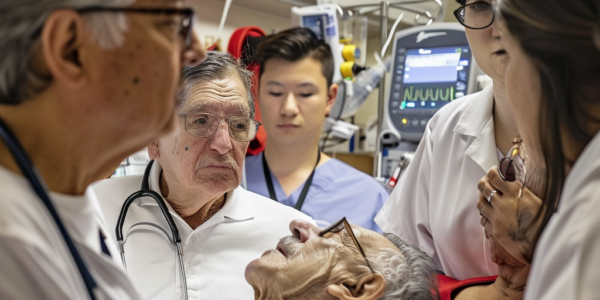Genomic Data in the All of Us Research Program
The All of Us Research Program is making significant strides in mapping the genetic basis of human disease, with a focus on diversity and inclusion. The latest release includes 245,388 clinical-grade genome sequences, with a high percentage of participants from historically under-represented communities and racial and ethnic minorities. The comprehensive dataset has identified over 1 billion genetic variants, with coding consequences for over 3.9 million, and is publicly available for researchers to access. This diverse dataset is expected to advance the promise of genomic medicine for all.
The Interconnected Nature of Spring Allergies
Learn how spring allergies can affect multiple systems within the body, from nasal allergies and asthma to eczema and eye allergies. Understanding the interconnected nature of allergic responses is crucial for effectively managing and improving quality of life for those affected.
Higher Sedation Rates for Hispanic Patients on Ventilators May Impact Survival
Hispanic Americans on ventilators have a higher risk of death than white peers, possibly due to heavy sedation. Research from NYU and University of Michigan found that Hispanic patients in respiratory failure receive heavy sedation at a rate five times that of white patients, potentially lowering their odds for survival. The study suggests that language barriers, cultural differences, and hospital quality may be contributing factors.
Prevalence of Nonprescribed Weight-Loss Product Consumption Among Adolescents: 5 Key Takeaways
A recent systematic review and meta-analysis published in JAMA uncovered 5 key takeaways about the prevalence of nonprescribed weight-loss product consumption among adolescents, shedding light on this concerning trend.
UC Davis Researchers Identify Gut Microbiome Changes Linked to Sorbitol Intolerance
UC Davis researchers have found that changes in the gut microbiome can lead to an inability to digest sorbitol, a sugar alcohol found in sugar-free products. A study with mice revealed that taking antibiotics and a high-fat diet reduced the number of Clostridia gut microbes responsible for breaking down sorbitol. The research suggests that an impairment in the microbial ability to break down sorbitol causes sorbitol intolerance, and efforts to restore the gut bacteria’s ability to break down sorbitol were successful in protecting the mice from sorbitol-induced diarrhea.
The Heightened Risks of Respiratory Viruses for Individuals with Heart Conditions
As the cold and flu season continues, millions of Americans are grappling with symptoms such as fever and dehydration from the flu, Covid, and RSV. Dr. Icilma V. Fergus, a cardiologist at New York’s Mount Sinai Hospital, explains the heightened risks associated with respiratory viruses for individuals with heart conditions. It is crucial for individuals with heart disease to be vigilant about any symptoms they experience during a viral infection, as viral-induced inflammation can potentially lead to heart failure or even a heart attack. Experts advise staying up to date with flu and Covid vaccinations and obtaining an RSV vaccine to mitigate the risk of illness.
Global Vaccine Safety Study Identifies Links Between Covid-19 Vaccines and Neurological, Blood, and Heart-Related Conditions
More than 13.5 billion doses of Covid vaccines have been administered globally, with a recent study linking certain vaccines to an increase in neurological, blood, and heart-related conditions. Despite the immense success of Covid vaccination efforts, a small proportion of vaccinated individuals experienced adverse effects, sparking discussions about the overall benefits and potential risks of the vaccines. The study, conducted by the Global Vaccine Data Network, focused on 13 medical conditions considered as ‘adverse events of special interest’ among 99 million vaccinated individuals in eight countries, emphasizing the need for continued monitoring of potential adverse effects as the global vaccination campaign continues.
Brazil Faces Surge in Dengue Fever Cases and Vaccine Shortage
Brazil is facing a significant surge in dengue fever cases, prompting a state of emergency and concerns about the country’s ability to combat the disease. The approval of the Qdenga vaccine offers hope, but limited availability has hindered widespread immunization. With a shortage of doses and a record number of deaths, the country is grappling with the impact of the climate crisis on disease proliferation.
Anorexia Nervosa in Adolescent Males: Identification and Treatment
Anorexia nervosa affects a small percentage of males with a higher mortality rate compared to the general population. Athletes, racially and ethnically diverse males, and LGBTQ+ individuals are at an elevated risk. Early identification and treatment are crucial in addressing this condition, which can lead to life-threatening complications. Family-based treatment is recommended as the first-line outpatient treatment for most adolescent males with anorexia nervosa.
NHS Cheshire and Merseyside Takes Proactive Measures Against Measles
NHS Cheshire and Merseyside is proactively combating the rise of measles cases by inviting thousands of school children, aged 6-11 years, to receive vaccinations against Measles, Mumps, and Rubella (MMR). Recent efforts have been made to encourage children who have missed their vaccinations to catch up, with reminders being sent to families throughout February and March. NHS leaders in Cheshire and Merseyside are urging parents and guardians of children aged 6-11 years to schedule any missed MMR vaccinations at their GP practices to ensure comprehensive protection against the disease.










